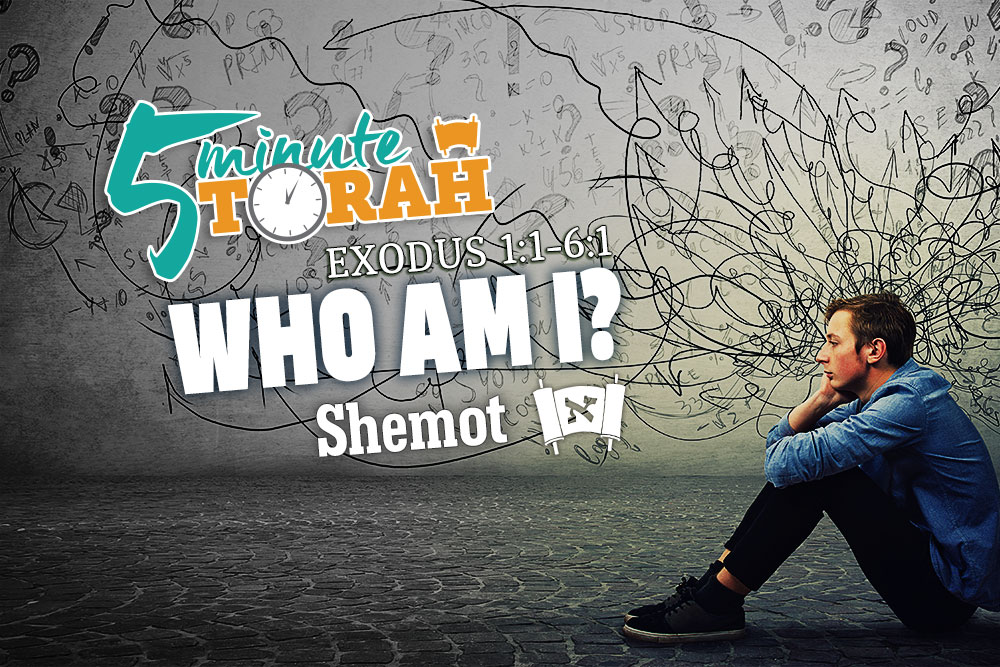Who Am I?
Series:

Shemot (Exodus 1:1-6:1)
This week’s Torah portion not only begins the book of Shemot, Exodus, but also the calling of Moses to his all-important task of delivering the Children of Israel from the hand of Pharaoh. We would think that since Moses was raised in Pharaoh’s royal house he would realize that he was the most qualified person to confront the King of Egypt and lead a group of slaves to their freedom. But when God confronted him at the burning bush, Moses replied with anything less than confidence, saying, “Who am I that I should go to Pharaoh and bring the children of Israel out of Egypt?” (Exodus 3:11). In other words, “What qualifies me to lead these people out from under Pharaoh’s hand?” Moses didn’t feel that he had the ability to accomplish what God had called him to do.
Similar instances occur among the prophets of Israel when they do not feel confident that they have the courage or skill to do what Hashem has instructed them. For instance, when the LORD tells Samuel that He has rejected Saul as king because of his wickedness, and that he should go to the house of Jesse to anoint a new king, Samuel responds by saying, “How can I go? If Saul hears it, he will kill me” (1 Samuel 16:2). Samuel knew that Saul would try to kill him because of jealousy. But God gave Samuel a plan and he obeyed.
Elijah, after defeating and slaughtering the prophets of Baal on Mount Carmel, fled to the wilderness when Queen Jezebel threatened to kill him as he had killed her false prophets. Even though God had just used him to do something bold and amazing, Elijah became afraid and gave in to that fear:
But he himself went a day's journey into the wilderness and came and sat down under a broom tree. And he asked that he might die, saying, “It is enough; now, O LORD, take away my life, for I am no better than my fathers.” (1 Kings 19:4)
Elijah was so distraught that he wanted to die. But God delivered him and continued to use him mightily until he was taken up into the heavens in the chariot of fire.
When preparing to build the Holy Temple, King David doubted the magnitude of God’s calling on him when the LORD told him, “I will make for you a great name, like the name of the great ones of the earth … Moreover, the LORD declares to you that the LORD will make you a house” (2 Samuel 7:9, 11). David couldn’t believe his ears. Here he was trying to bless God by creating a holy house for His presence to dwell, and God responds by saying that He will make a house (i.e. a dynasty) for David. David responded, “Who am I, O LORD God, and what is my house, that you have brought me thus far?” (vs. 18).
Moses was in a similar situation. According to Or HaChaim, a Moroccan Rabbi from the eighteenth century, the response of Moses here revealed a lack of confidence that he could accomplish the task assigned to him by the LORD. He no longer saw himself as one raised in Pharaoh’s palace, but as merely the shepherd he had become, thinking “Who am I, a lowly shepherd, that I should appear before the King of Egypt and demand that the Israelites be released?” In his mind, even if he did get an audience with Pharaoh, surely he would be killed the moment he opened his mouth. Not only that, but he also knew that he would be held responsible for his failure to bring out the Children of Israel. This put a double fear inside of him.
However, despite the doubt expressed by Moses, Hashem alleviated his fear with one simple response: “I will be with you” (Exodus 3:12). These are the words we all need to hear repeatedly and hold tightly in our hearts: “I will be with you.” The God of the Universe is with us … with me … and I can do what He has called me to do. It’s easy to lose track of this simple fact, but we have to remember that if our Creator has given us a task—despite how impossible it may seem—He has also placed within us the ability to carry it through.
Sometimes all we can see is our limitations and inadequacies when we have an entire list of assets we haven’t even tapped into. Sometimes it’s difficult to remember that we were assigned our individualized task here on planet Earth by a wise and all-knowing Creator who tailored us specifically for that purpose. Sometimes we are so focused on who we aren’t that we fail to remember who we are.
Who am I? I am the salt of the earth, bringing life and flavor to those around me. I am the light of the world, a city set on a hill that cannot be hidden. I shine my light so that others may see my good deeds and give glory to my Father in heaven (Matthew 5:13–16). I am uniquely designed to succeed at what God has created me to accomplish. Now I ask you, “Who are you?”








